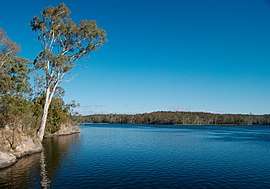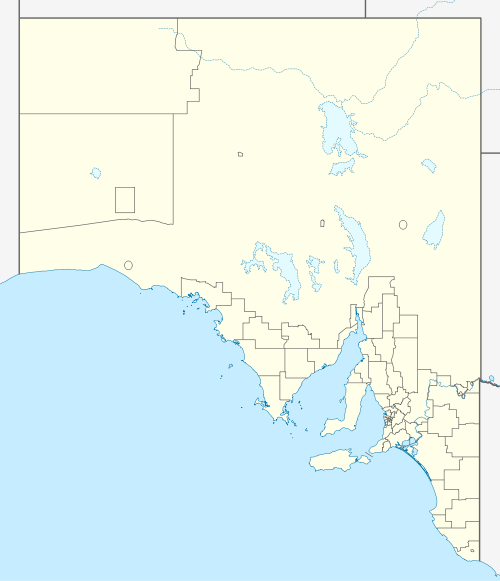Hundred of Barossa
The Hundred of Barossa is a cadastral unit of hundred in South Australia in the northern Adelaide Hills.[3] It lies west of the Barossa Range at the south end of the Barossa Valley and is bounded on the north and south by the North Para and South Para rivers, respectively. It is the most northern of the eleven hundreds of the County of Adelaide and was named in 1846 by Governor Frederick Robe after the Barossa Range.
.jpg)
| Barossa South Australia | |||||||||||||||
|---|---|---|---|---|---|---|---|---|---|---|---|---|---|---|---|
 Barossa Reservoir, Williamstown, at the hundred's centre | |||||||||||||||
 Barossa | |||||||||||||||
| Coordinates | 34°37′43″S 138°52′46″E[1] | ||||||||||||||
| Established | 29 October 1846[2] | ||||||||||||||
| Area | 255 square kilometres (98.5 sq mi)[1] | ||||||||||||||
| LGA(s) | Barossa Council[1] | ||||||||||||||
| Region | Barossa Light and Lower North[1] | ||||||||||||||
| County | Adelaide[1] | ||||||||||||||
| |||||||||||||||
The principal towns within the hundred are Williamstown, Lyndoch, and Gawler East at the western edge. Other localities include Kalbeeba, Concordia, Rosedale, Sandy Creek, Cockatoo Valley, Barossa Goldfields, Pewsey Vale, Altona and Rowland Flat.
Local government
Dual local government was established for the hundred in January 1854 with the formation of the District Council of Barossa West. A few months later in June of that year the district councils of Barossa East and Mount Crawford were established to administer the north east and south east of the hundred, respectively. After lobbying by dissatisfied residents of Gawler at the confluence of the North Para and South Para rivers, the Town of Gawler was established in 1857 to govern the township of Gawler, annexing a small portion of Barossa West. In 1888, Barossa West and Barossa East councils were amalgamated as the District Council of Barossa bringing the whole hundred except for Gawler under the governance a single local council. The council remained in place for more than a hundred years before it was amalgamated with the District Council of Angaston and District Council of Tanunda to the north to form the much larger modern Barossa Council.
References
- "Search results for 'Sandy Creek Conservation Park' with the following datasets selected – "Suburbs and Localities", "Counties", "Hundreds", "Government Towns", "Local Government Areas", "SA Government Regions" and "Gazetteer"". Location SA Map Viewer. South Australian Government. Retrieved 29 June 2019.
- Mundy, A.M. (29 October 1846). "South Australia, Proclamation (re Counties of Adelaide and Hindmarsh)" (PDF). The South Australian Government Gazette. Government of South Australia. p. 357. Retrieved 29 June 2019.
- "Placename Details: Hundred of Barossa". Property Location Browser. Government of South Australia. 19 March 2010. SA0002949). Retrieved 25 October 2017.
Derivation of Name: Barossa Range